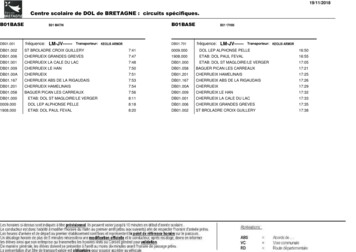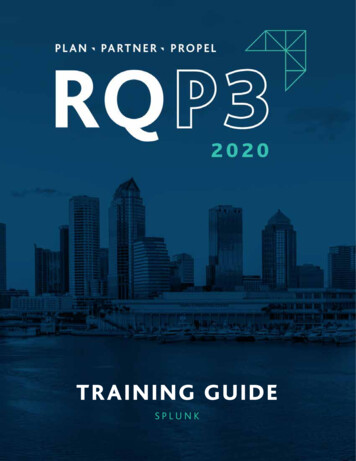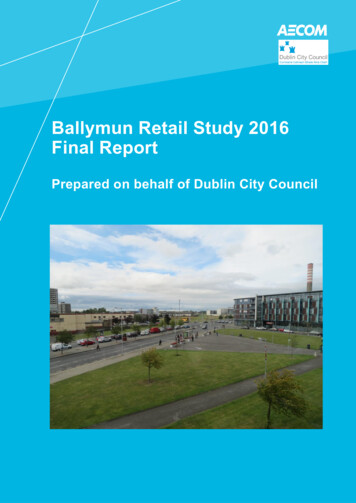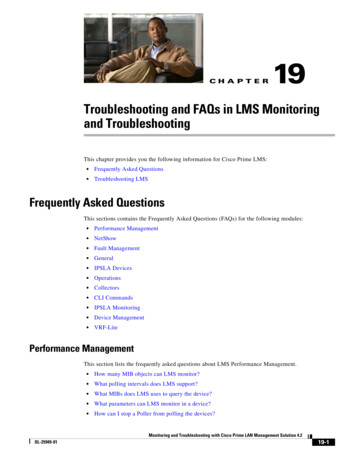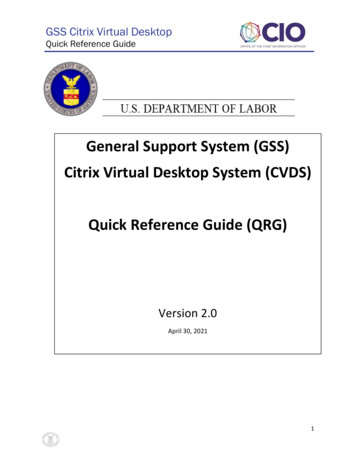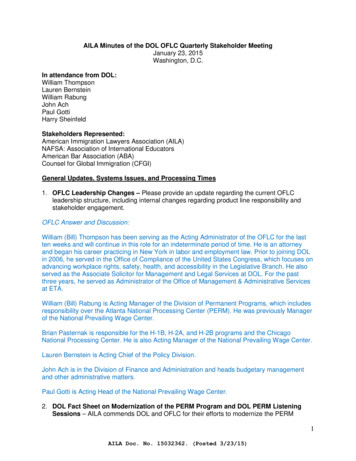
Transcription
AILA Minutes of the DOL OFLC Quarterly Stakeholder MeetingJanuary 23, 2015Washington, D.C.In attendance from DOL:William ThompsonLauren BernsteinWilliam RabungJohn AchPaul GottiHarry SheinfeldStakeholders Represented:American Immigration Lawyers Association (AILA)NAFSA: Association of International EducatorsAmerican Bar Association (ABA)Counsel for Global Immigration (CFGI)General Updates, Systems Issues, and Processing Times1. OFLC Leadership Changes – Please provide an update regarding the current OFLCleadership structure, including internal changes regarding product line responsibility andstakeholder engagement.OFLC Answer and Discussion:William (Bill) Thompson has been serving as the Acting Administrator of the OFLC for the lastten weeks and will continue in this role for an indeterminate period of time. He is an attorneyand began his career practicing in New York in labor and employment law. Prior to joining DOLin 2006, he served in the Office of Compliance of the United States Congress, which focuses onadvancing workplace rights, safety, health, and accessibility in the Legislative Branch. He alsoserved as the Associate Solicitor for Management and Legal Services at DOL. For the pastthree years, he served as Administrator of the Office of Management & Administrative Servicesat ETA.William (Bill) Rabung is Acting Manager of the Division of Permanent Programs, which includesresponsibility over the Atlanta National Processing Center (PERM). He was previously Managerof the National Prevailing Wage Center.Brian Pasternak is responsible for the H-1B, H-2A, and H-2B programs and the ChicagoNational Processing Center. He is also Acting Manager of the National Prevailing Wage Center.Lauren Bernstein is Acting Chief of the Policy Division.John Ach is in the Division of Finance and Administration and heads budgetary managementand other administrative matters.Paul Gotti is Acting Head of the National Prevailing Wage Center.2. DOL Fact Sheet on Modernization of the PERM Program and DOL PERM ListeningSessions – AILA commends DOL and OFLC for their efforts to modernize the PERM1AILA Doc. No. 15032362. (Posted 3/23/15)
program as described in the November 20, 2014 DOL Fact Sheet and in seekingstakeholder feedback through the recent PERM Listening Sessions. Could you provide anydetails regarding the timeline for possible changes to the PERM program, LCA program,and/or temporary programs such as H-2A and H-2B? Will there be opportunities for formalstakeholder input on possible changes before they are implemented?OFLC Answer and Discussion:The PERM Listening Sessions are designed to provide OFLC with input from all interestedparties as it reviews the PERM program from end to end. OFLC is currently in fact-gatheringmode and has not yet made any decisions on what, if any, changes might be made to thePERM program, or whether changes will be done by way of new regulations. This review is anin-depth and lengthy process, and OFLC is reaching out to the employer community,stakeholder groups, labor groups, and other interested parties to obtain comments andsuggestions for changes to the PERM program.3. Processing Times – Many AILA members have reported substantially improved processingtimes for unaudited PERM cases, with a significant number of cases being processed in lessthan 6 months. Audited cases, however, are now taking in excess of 1 ½ years. DoesOFLC anticipate a reduction in processing times for audited cases in the near future? Forprevailing wage determinations, we have seen the NPWC issue wage determinations fromtime to time in less than 6 weeks, but 8 weeks is more common. Does NPWC anticipate areduction in processing times for prevailing wages as part of the modernization of the PERMprogram?OFLC Answer and Discussion:OFLC is continuing to struggle with resource limitations and increased filing volume.Opportunities to improve processing efficiencies and make other changes are part of thebroader review that is currently being conducted at OFLC. However, there is no specific timelinefor changes, nor have any decisions been made to make specific changes to the way in whichPERM applications, prevailing wage determination requests, or other cases are processed.4. Employer Sponsorship Verification - Under current OFLC practice, if the employer doesnot receive the sponsorship verification questionnaire or is unable to respond to thequestionnaire within 7 days, an OFLC contractor will attempt to contact the employer bytelephone to verify sponsorship. The contractor will not leave a message if he/she is unableto speak with the employer. If the contractor is not able to speak to the employer after fourattempted telephone contacts, the PERM application is denied. Employers who contact theAtlanta National Processing Center by telephone or e-mail in an attempt to confirmsponsorship are informed that they will be contacted in the future and are not allowed toaffirmatively confirm sponsorship. Denials based upon failure to verify sponsorship wouldlikely be reduced if an employer was able to affirmatively contact OFLC rather than waitingto be called in the event the sponsorship e-mails are not received. For example, couldOFLC establish either a telephone number and/or e-mail address specifically forsponsorship inquires where employers who were not able to verify sponsorship on-line cando so affirmatively? If a special contact system cannot be implemented, can the contractorscalling to verify sponsorship be instructed to leave a voicemail message with a telephonenumber and/or e-mail address where the employer can respond to the call with thesponsorship confirmation?2AILA Doc. No. 15032362. (Posted 3/23/15)
OFLC Answer and Discussion:Employer sponsorship is an important part of preserving the integrity of the PERM program.Employers should make every effort to respond to the first verification e-mail as soon aspossible. When OFLC does not receive a response, it attempts to contact the employer byphone. This diverts the already limited resources of the agency and impacts resource availabilityfor other parts of the program. The verification process is also part of the overall review, andOFLC took note of the suggestions provided by AILA and other stakeholder groups regardingpossible changes but could not comment on whether or when changes might be made.5. OFLC Help Desk Update – At the September 2014 stakeholder meeting, a number ofexamples were provided regarding problems that AILA members had encountered with theOFLC Help Desk, primarily related to such issues as PERM account registration changesand similar technical issues. Please provide an update on the options for obtainingassistance when the Help Desk is unable to provide a solution or update, both on thesekinds of technical problems as well as on substantive problems, such as case processingthat is substantially overdue or errors on certified cases? (Examples reported by AILAmembers include an application that was erroneously classified by DOL as a sheepherdercase, and a case where an H-2B certification listed incorrect dates of employment.)OFLC Answer and Discussion:OFLC is aware of the concerns raised about the Help Desk, and noted that Help Deskimprovements are part of the overall review process currently being conducted by OFLC. In theinterim, OFLC noted that it is important to ensure that the correct Help Desk is being contacted,and referenced the guide on its /oflcHelpDesks.pdf) that delineates Help Deskresponsibilities.OFLC welcomed the opportunity to receive the results of AILA’s survey of members on theresponsiveness of the OFLC Help Desk. AILA explained that one of the biggest concerns iswhen a case is overdue and the Help Desk responds by saying the case is still “in process.”AILA asked that OFLC consider having the Help Desk provide more detailed information andinquired as to what occurs internally after a Help Desk inquiry is placed on an overdue case.OFLC declined to discuss its internal processes, but stated that it will continue to review theHelp Desk issue as part of its broader program review.Prevailing Wage Issues6. Alternate Wage Survey Publication Date Documentation – AILA has received reportsfrom a number of members where alternate wage surveys are being rejected by NPWC onthe basis that the version submitted is not the most current version. For example, whilemany Radford surveys are updated monthly, some are updated only quarterly. During theSeptember 12, 2014 stakeholder meeting, OFLC indicated that an employer seeking aprevailing wage based on an alternate wage survey is free to upload documentation fromthe survey company demonstrating that the survey is the most recent edition. Is there aspecific type of documentation that should be submitted to demonstrate that the surveyprovided is the most recent?OFLC Answer and Discussion:3AILA Doc. No. 15032362. (Posted 3/23/15)
OFLC confirmed that it will accept an alternate wage survey if the job description is anappropriate match, the survey meets the OFLC’s requirements, and the version of the survey isthe most current at the time the prevailing wage request is submitted. Employers should submitdocumentation from the publisher which clearly demonstrates the publication schedule andshows that the survey provided is the most recent version. OFLC noted that it is seeing a fairnumber of requests where the documentation submitted regarding publication date is from adifferent survey than the one being submitted.7. Requests for Reconsideration, Center Director Review and BALCA Appeals ofPrevailing Wage Requests – Has the NPWC seen an increase in the number ofreconsideration requests, requests for Center Director review, or BALCA appeals regardingprevailing wage determinations? What can employers expect to see in terms of normalprocessing times for these requests, and is there a mechanism to follow-up on suchrequests that are outside normal processing times?OFLC Answer and Discussion:OFLC has not seen a noticeable increase in reconsideration requests, requests for CenterDirector review, or BALCA appeals. OFLC’s goal is to complete each step of the prevailingwage process within 60 days, so when a reconsideration request is filed, OFLC will attempt toadjudicate that reconsideration request within 60 days of receiving it. The same approach istaken with requests for Center Director review.One stakeholder noted that some employers may not be using requests for reconsiderationgiven that the processing timeframe is the same as a new request, and instead those employersare submitting a new wage determination request. OFLC invited stakeholders to provide specificexamples of inconsistencies and cases where the employer believes the incorrect wageclassification has been assigned.Labor Condition Applications8. H-1B Cap and LCAs – With the upcoming H-1B cap filing season, it is expected thatthere will be the usual surge in LCA filings, including “last minute” filings in late March2015. AILA greatly appreciates the efforts made by OFLC last year to ensure that LCAswere processed on a timely basis notwithstanding the tremendous increase in filingvolume. Does OFLC have similar plans in place to accommodate what is likely to be aneven greater increase in LCA filings this year? Are there any upcoming systemmaintenance plans or system outages anticipated before April 1st of which stakeholdersshould be aware from a planning standpoint?OFLC Answer and Discussion:Over the past year, OFLC has been having routine updates to the system every Friday afterbusiness hours, and there have been no service disruptions. There is one planned iCERT fix inearly February, but no other system upgrades are planned in the near future. OFLC willcontinue to make its best efforts to process LCAs within the required 7 day period.PERM Processing Issues4AILA Doc. No. 15032362. (Posted 3/23/15)
9. Overdue Processing of PERM Cases - At the September 12, 2014 stakeholderengagement meeting, AILA provided OFLC with a list of a sample of long overdue PERMcases, together with questions regarding FIFO processing. An updated representative list ofcases outside of posted processing times is included with this agenda. We appreciateOFLC’s willingness to review these cases and provide insight as to what might be the causefor delay. At the September 2014 meeting, OFLC noted that some of these cases may bestill pending due to policy questions, litigation, additional employer verification activities, andother considerations requiring further review. Many of the pending applications date back tolate 2012 to early/mid 2013 and most are at the initial review (non-audit) stage. Would OFLCplease provide an update regarding backlogged cases generally?OFLC Answer and Discussion:OFLC reported that it had researched the cases previously provided by AILA. Of the 51 caseexamples, 37 have been certified, 1 was withdrawn, 1 was denied, and 2 cases were audited.The remaining 10 cases are for a specific employer and are on hold for a particular policydecision. As the results of the sample cases provided by AILA demonstrates, there arecircumstances where cases will sometimes fall behind, and occasionally cases are held pendingthe outcome of a particular policy decision that will affect multiple cases. However, OFLCreiterated that it attempts to process cases on a “first In, first out” basis, and that processingtimes posted on iCERT are maintained as accurately as possible.10. Update on Reversal of “Section K” Denials - Thank you for your assistance in acceptinga list of PERM cases that were denied on the basis of a missing credential in Section K, andreviewing these cases for possible reversal and certification. The way that OFLC hasworked with stakeholders to address these cases is an example of how the stakeholderliaison process is mutually beneficial: OFLC reduces its backlogs by removing certifiablecases from the Motion to Reconsider and BALCA queues, and employers get their casescertified faster without wasting unnecessary time and resources on avoidable motions andappeals. Please provide an update on the status of OFLC’s review of these cases, and theexpected timeframe for completing the review. Is there anything further we can do to assistOFLC in getting these cases resolved as quickly as possible?OFLC Answer and Discussion:OFLC confirmed that it will reverse denials issued on the basis of a non-experience qualificationthat was missing from Section K as long as that is the sole reason the case was denied. It iscontinuing to work through the list of cases provided by AILA and other stakeholder groups. Inaddition, employers can file a Motion for Remand with BALCA and e-mail Harry Sheinfeldfollowing the procedures described at AILA Doc. No. 14022555 to expedite the identification ofSection K cases pending with BALCA. Those cases will be returned to OFLC for review andcertification if the Section K issue is the only basis for denial.11. Withdrawal Confirmation and Re-filing of Cases After Withdrawal – We understand thatOFLCs current policy is to allow employers to have pending only one labor certificationapplication for the same job opportunity for the same employee at any given time. Once acase is filed, however, there may be circumstances where the employer discovers an errorand wishes to withdraw the application, rather than waiting for the application to be denied.When an application is withdrawn, the system does not always appear to immediately reflectthat withdrawal, and waiting for the system to update is often not an option given expirationof the prevailing wage determination or the labor market test. If the employer immediately5AILA Doc. No. 15032362. (Posted 3/23/15)
re-files the application before the withdrawal is acknowledged, it might appear that twoPERM applications are pending for the same employee for the same job opportunity.Historically, when OFLC discovered two pending applications that appeared to be based onthe same job opportunity and for the same employee, it typically contacted the employer orthe attorney to inquire as to which application should proceed. Is this still OFLC’s practice?If not, what steps can an employer take to immediately re-file an application without fear thatthe application will be denied due to a withdrawal that has not yet been processed?OFLC Answer and Discussion:When two PERM applications are pending with the same employer for the same beneficiary forthe same job, the policy is to contact the employer to ask which application should proceed.Therefore, it should not be necessary to wait until the withdrawal is confirmed to file a newPERM application. AILA noted that it has received reports of denials issued on this basis, andOFLC stated that employers may file a Motion for Reconsideration if they believe this policy hasnot been followed.12. Review of Audit Template Language – We understood from the September 2014Stakeholder meeting that OFLC was considering a review of the entire PERM audit process.Is that still a project that OFLC is planning to complete?Should OFLC decide to review its audit templates, whether as part of a larger process or justlooking at particular templates, AILA would suggest a revision to language on audits relatingto business necessity and on-the-job training of U.S. workers, as the current language canbe somewhat confusing. In particular, we would suggest the following:a. Business Necessity - Where an employer’s requirements are undulyrestrictive, the employer must establish the business necessity. The currentaudit language, however, is unclear regarding its application. Below is oneexample of the language from the current template:Please provide business necessity for all/any levels(s) of education,experience, training, skills and/or qualifications for the job opportunity of aas listed on the ETA Form 9089.This language seems to indicate that the employer must explain the businessnecessity for each and every requirement listed on the ETA Form 9089. Is OFLCintending to ask for business necessity for the degree listed, or for a degree onlyif it exceeds the degree noted on O*Net? Is OFLC intending to ask for businessnecessity for each skill listed, or only for skills not part of the O*Net description?Is OFLC intending to ask for business necessity for the years of experience, oronly for experience requirements that exceed the SVP?Below is another example of language from the current template:The employer must provide business necessity for any requirementexceeding the minimum baseline requirement of SPV level 7.This language has been included for cases with Job Zone 4 positions (SVP 7). Itsuggests that if the employer requires experience above the low end base (in thiscase 2 years) a business necessity explanation is required. To maintain better6AILA Doc. No. 15032362. (Posted 3/23/15)
consistency with 20 C.F.R. § 656.17(h), and to provide a more focused request,we would suggest instead the following language:Please provide business necessity for any experience requirement thatexceeds the upper end of the SVP for the following special skill(s):[The reviewing officer should then list the skill (or skills) which are beingviewed as potential unduly restrictive.]b. On-the-Job Training to Acquire Skills - The regulations prohibit therejection of U.S. workers for lacking “skills necessary to perform the dutiesinvolved in the occupation, where the U.S. workers are capable of acquiringthe skills during a reasonable period of on-the-job training is not a lawful jobrelated reason for rejection of the U.S. workers.” However, the current auditlanguage requires an employer to provide an explanation of why anyunqualified U.S. worker cannot be trained on-the-job, whether they wererejected for not satisfying the degree and experience requirements or forlacking a skill. Common language in audits on this point is:Please provide documentation explaining why the U.S. applicantsdeemed “not qualified” could not have attained the skills necessary toperform the duties listed in section H.11 during a reasonable period of onthe-job training.The language of the regulation limits on-the-job training only to cases where theU.S. applicant lacked the skill required. We would therefore suggest thefollowing alternate audit language:For any U.S. applicant who lacks a required skill or skills, please providedocumentation explaining why the rejected U.S. applicant could not haveattained the skill(s) necessary to perform the duties listed in section H.11during a reasonable period of on-the-job training.In addition, for cases under the Special Handling regulation, OFLC should draftlanguage that is specific to the recruitment standard for college and universityfaculty. We would suggest the following language:For Special Handling cases for college and university faculty, pleaseprovide documentation explaining why the foreign worker was “morequalified” than any rejected U.S. applicant.OFLC Answer and Discussion:OFLC thanked AILA for its suggested revisions to the audit language, and stated that review ofthe language used in audits is part of the overall review of the PERM process that is currentlyunderway. As with other PERM issues being reviewed, OFLC could not provide an estimateregarding the timing of any changes that might be made.PERM Denials7AILA Doc. No. 15032362. (Posted 3/23/15)
13. Pre-Hire Testing Requirements. At the September 2014 stakeholder meeting, AILAprovided examples of several PERM cases that had been denied without audit because ofpre-hire testing requirements. During the discussion of this issue at the meeting, AILA notedthat numerous similar cases had been approved in the past, both in the context of auditsand supervised recruitment. OFLC noted that it would review this issue in greater detail. Isany further update available at this time?OFLC Answer and Discussion:OFLC is continuing to review this issue, and asked AILA to resubmit examples of these denials.(Additional Question Raised at Stakeholder Meeting that was not on the Agenda)Employer-Provided Wage SurveysStakeholders have noticed that the NPWC has been rejecting College and UniversityProfessional Association (CUPA) surveys that have long been accepted and has indicated thatsuch surveys now do not meet the ACWIA definition. Could OFLC provide an explanation as towhy these surveys are being rejected?OFLC Answer and Discussion:OFLC indicated that if the CUPA survey includes for-profit institutions (e.g., University ofPhoenix), the survey does not meet the ACWIA definition. The employer must demonstrate thatthe survey is based on data that is only from ACWIA employers, i.e., non-profit educationalinstitutions, and for educational occupations.AILA requested that in the OFLC’s PERM process review, it also consider issuing guidance onthe requirements for qualifying as an ACWIA employer, given the difference between DOL andUSCIS regulatory definitions.AILA also requested that OFLC provide guidance regarding acceptance/rejection of employerprovided surveys. OFLC indicated that when a flaw in an employer-provided survey iscorrectable, it will sometimes issue a Request for Information (RFI). However, when an RFI willnot make a difference, i.e., a non-correctable fact such as the inclusion of a for-profit institutionamong the list of employers for a CUPA survey, the request will be denied without an RFI.8AILA Doc. No. 15032362. (Posted 3/23/15)
many Radford surveys are updated monthly, some are updated only quarterly. During the September 12, 2014 stakeholder meeting, OFLC indicated that an employer seeking a prevailing wage based on an alternate wage survey is free to upload documentation from the survey company demonstrating that the survey is the most recent edition. Is there a


